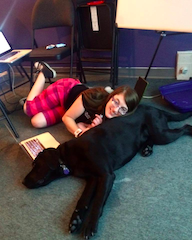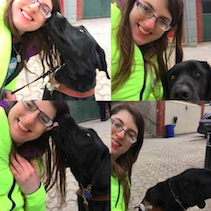What's This About Hypoallergenic Dogs?
If you saw my Why Having a Dog Would Be Good For My Asthma video, you’ll already know I love dogs. Big dogs. Preferably retrievers—labs or goldens—but you know, I’m not picky.
Many of us suffer from dog allergies
Once upon a time I had an allergy test which told me I was allergic to dogs. The next time I had allergy tests done (just a few months later because I felt like something was wrong with the first one based on the comments of the clinic staff), I was not deemed allergic to dogs.
If you want a dog, consider a hypoallergenic breed
There’s talk around of “hypoallergenic” dogs and cats. And I mean, not just the hairless kinds. (I kinda like my animal friends full of fur, but that’s just me.) Common breeds of dogs typically presumed to be better for people with allergies include a variety of terriers, poodles and greyhounds, just to name a few!1
And, actually, as the research stands on “hypoallergenic” dogs, hairless ones might not even be lower in allergens than long haired, shed-y ones, either!1 It is not just the dog hair that people are allergic to—often, saliva or dander (skin flakes) are what trigger reactions for people.
And love it or hate it, it’s a bit hard to stop an excited dog from licking your face (or hands for those people who keep their face out of puppy kissing distance… AKA not me).
Special considerations for dog dander
Larger dogs, of course, have more dander (and slobber) to share, so it may be harder to keep allergens in check—many big dogs have longer fur, too, which may be the allergy-causing culprit for some.
One study in particular, measured dog shedding from flooring in the home, rather than taking samples directly from the dog, states that there was no significant difference in shedding of dogs deemed hypoallergenic versus those not deemed as such.1 (Though I’m now curious which season the research was done!) The research, published in 2011, advises clinicians to educate patients to not rely on “hypoallergenic” dog breeds to legitimately disperse less allergen (thus theoretically holding less of a risk to patients with allergies) in their home.1
What is the best dog for your asthma?
The reality is, it is hard to tell what may cause a person with a dog allergy to react to a particular dog—even within the same breeds, dogs have very individual chemistry, which is reacted to differently by among each person.2 In theory, even so-called “hypoallergenic” dog breeds may not be a good choice for some people with asthma, whereas another dog that’s not been deemed “hypoallergenic” could be! Like everything seems to be with asthma, it’s all very individual to how your body responds.
Dog allergy or not, hypoallergenic or not, I guess my love for labs still stands!



Join the conversation